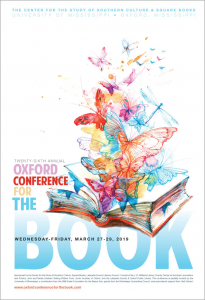Including writers from Oxford and as far away as California, the annual Oxford Conference for the Book will convene from today until Friday at several Oxford and Ole Miss locations. The conference will feature talks and readings about topics, in the words of its director, Jimmy Thomas, “from cognitive psychology to a history of the first 300 years of New Orleans.”
Some of today’s events include Travis McDade talking about “Art, Science, and the Pillaging of American University Libraries” at 11:30 a.m. in the library as well as talks with Edmund White, Michael Carroll and David Zurick at the Overby Center.

Photo Courtesy: Oxford Conference of the Book
Thursday’s schedule focuses on Southern studies and includes panels on “The Spiritual South” and “The Appalachian South.” Friday is focused more on the literary side, with panels on editing, poetry and noir literature.
Thomas also serves as associate director for publications for the Center for the Study of Southern Culture. He said that this year’s conference will have events that appeal to a wide range of people, including students.
“Admittedly, and for good reason, many of the authors speak to topics that we study here in Southern studies, but I believe that many of those topics are of interest to UM students, whether they be business majors or English majors or engineering majors,” Thomas said.
One of those students is Luke Lee, a senior English education major, who is interested in sessions about New Orleans history, making smart decisions and Kiese Laymon’s memoir “Heavy.” He plans to attend the conference for the first time this year.
Since he is currently a student teacher and will be a full-time teacher next year, Lee said he hopes to learn more about books and authors that he can introduce to his students, especially Laymon’s book.
“‘Heavy’ was easily the most raw and enlightening Southern memoir I have ever read. I’m specifically interested in how ‘Heavy’ can help me in the classroom next year,” Lee said. “I’m an English education student committed to working in Mississippi, and his insight will be invaluable when I start.”
Thomas, who teaches Liba 102 classes in addition to serving as conference director, also said that the conference sessions are a great opportunity for students to learn about topics related to their classes without the pressure of completing homework or getting a grade.
“It’s a great way to introduce students to the people who have written works that they are reading in classes as well as introduce them to some new ideas that we haven’t discussed,” Thomas said.
Several faculty members plan to bring their students to panels relevant to their classes.
Katie McKee, an Ole Miss professor of English and Southern studies, plans to take her SST 102 class to the panel about “The Appalachian South.” In class, they read Karida Brown’s book “Gone Home: Race and Roots through Appalachia.”
“The Appalachian South” panel features scholars Brown, Jessie Wilkerson, Elizabeth Catte and Meredith McCarroll. Wilkerson, an Ole Miss professor of history and Southern studies, said that one of the session’s main goals is to challenge faulty generalizations and simplistic images of the region.
“All of the panelists in some way introduce their readers to new ways of thinking critically about Appalachia and what it means in American culture,” Wilkerson said. “They also educate readers on lesser known people and places in Appalachia.”
During the session, Wilkerson will discuss her book “To Live Here, You Have to Fight.”
“(The book) places women at the center of 20th century Appalachian history and seeks to correct simplistic narratives about the War on Poverty and local people’s, especially women’s, relationship to it, and Appalachian involvement in twentieth-century social movements,” Wilkerson said.
Wilkerson said some of her advanced Southern studies students plan to attend the conference.
“(My students) are very excited to meet the authors, whose work they’ve read and admired,” Wilkerson said. “I think what makes the conference so special is that students can meet the authors whose works they’ve enjoyed–it’s rare to have that opportunity.”
Thomas said that selecting panels is a collaborative effort involving campus committees and Square Books.
“The conference participants are generally selected by various committees from across Southern studies and campus,” Thomas said. “Square Books plays a big part in author selection since they often know what new books will be published far in advance of publication.”






